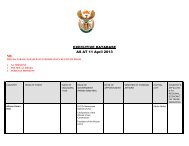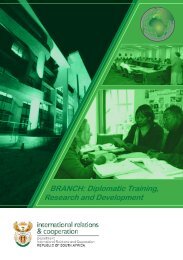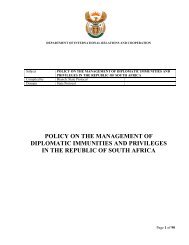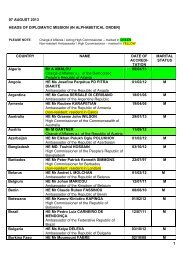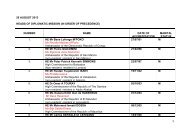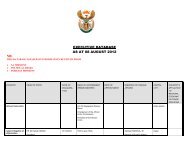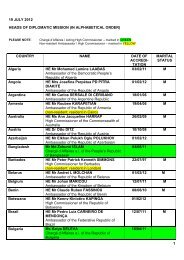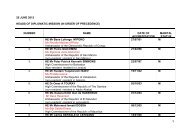Practical Guide and Procedures for the Conclusion of Agreements
Practical Guide and Procedures for the Conclusion of Agreements
Practical Guide and Procedures for the Conclusion of Agreements
Create successful ePaper yourself
Turn your PDF publications into a flip-book with our unique Google optimized e-Paper software.
<strong>the</strong> dfa<br />
Department<br />
Foreign Affairs<br />
1
CONTENTS<br />
FOREWORD 2<br />
OFFICE OF THE CHIEF STATE LAW ADVISER (IL) 3<br />
State Law Advisers (IL) 4<br />
Legal Officers<br />
Treaty <strong>and</strong> In<strong>for</strong>mation Management Section 5<br />
Treaty Section<br />
Legal Library 6<br />
PROCEDURES FOR<br />
Requesting legal advice 7<br />
Concluding international agreements<br />
Obtaining a President’s Minute 8<br />
Certification <strong>of</strong> agreements<br />
Technical, administrative or executive agreements requiring 9<br />
National Executive approval in terms <strong>of</strong> section 231(3) <strong>of</strong> <strong>the</strong> Constitution<br />
<strong>Agreements</strong> requiring parliamentary approval <strong>for</strong> Ratification 9<br />
or Accession in terms <strong>of</strong> section 231(2) <strong>of</strong> <strong>the</strong> Constitution<br />
Signing <strong>of</strong> international agreements during a conference 10<br />
Depositing documents with <strong>the</strong> Treaty Section<br />
Binding <strong>of</strong> agreements, Instruments <strong>of</strong> Ratification or Accession<br />
GUIDELINES FOR DRAFTING OF AGREEMENTS 11<br />
USEFUL INFORMATION<br />
Contact details 17<br />
Legislation administered by <strong>the</strong> Department <strong>of</strong> Foreign Affairs<br />
ANNEXURES 18<br />
FLOWCHARTS 21<br />
PAGE
FOREWORD<br />
The purpose <strong>of</strong> this <strong>Practical</strong> <strong>Guide</strong> is to assist you in underst<strong>and</strong>ing <strong>the</strong> constitutional processes<br />
<strong>and</strong> procedures that must be followed in order to conclude international agreements.<br />
Since <strong>the</strong> inception <strong>of</strong> <strong>the</strong> modern state system, international law (<strong>the</strong> law between states <strong>and</strong> between states <strong>and</strong><br />
international organisations) has been one <strong>of</strong> <strong>the</strong> mechanisms with which states attempted to establish <strong>and</strong> keep<br />
international peace <strong>and</strong> order. In <strong>the</strong> period prior to <strong>the</strong> First World War, international law operated in a bilateral<br />
context within an international community consisting <strong>of</strong> a limited number <strong>of</strong> states. After 1919, <strong>and</strong> even more so after<br />
<strong>the</strong> Second World War, <strong>the</strong> advent <strong>of</strong> multilateral diplomacy intensified international interaction. It was especially <strong>the</strong><br />
need to create new legal regimes on all aspects <strong>of</strong> state interaction/interrelations that firmly established international<br />
law as a cornerstone <strong>of</strong> modern diplomacy.<br />
Since <strong>the</strong> end <strong>of</strong> <strong>the</strong> Cold War, international security has also been increasingly defined in terms <strong>of</strong> human security<br />
ra<strong>the</strong>r than that <strong>of</strong> <strong>the</strong> state <strong>and</strong> its physical integrity. Contemporary international challenges to governments like<br />
population flows <strong>and</strong> refugee problems (<strong>of</strong>ten resulting from <strong>the</strong> gross human rights violations or conflicts <strong>and</strong> civil<br />
wars within <strong>the</strong> borders <strong>of</strong> states), fatal diseases, environmental threats <strong>and</strong> organised crime, can only be addressed by<br />
inter-governmental co-operation <strong>and</strong> regime creation, processes that need to be embedded in international law. These<br />
developments necessitate <strong>the</strong> involvement <strong>of</strong> <strong>the</strong> legal adviser trained in international law in <strong>the</strong> <strong>for</strong>mulation <strong>and</strong> conduct<br />
<strong>of</strong> a state’s diplomacy.<br />
The State Law Advisers specialising in international law are situated in <strong>the</strong> Office <strong>of</strong> <strong>the</strong> Chief State Law Adviser (IL)<br />
(hereafter referred to as “<strong>the</strong> Office”), located within <strong>the</strong> Department <strong>of</strong> Foreign Affairs.<br />
The Office is here to render a service to you <strong>and</strong> to assist where it can. We trust that this <strong>Practical</strong> <strong>Guide</strong><br />
will serve to in<strong>for</strong>m you about <strong>the</strong> activities <strong>of</strong> <strong>and</strong> services <strong>of</strong>fered by <strong>the</strong> Office, <strong>and</strong> <strong>the</strong> procedures to<br />
follow in order to conclude international agreements <strong>and</strong> to utilise <strong>the</strong> services that are at your disposal,<br />
in <strong>the</strong> Office.<br />
OFFICE OF THE CHIEF STATE LAW ADVISER (IL)<br />
Composition <strong>of</strong> <strong>the</strong> Office<br />
The Office consists <strong>of</strong> three components, namely <strong>the</strong> State Law Advisers (IL), <strong>the</strong> Legal Officers <strong>and</strong> <strong>the</strong> Treaty <strong>and</strong><br />
In<strong>for</strong>mation Management Section that are at <strong>the</strong> disposal <strong>of</strong> clients.<br />
The mission <strong>and</strong> vision <strong>of</strong> <strong>the</strong> Office<br />
The Office renders a pr<strong>of</strong>essional specialised service to all its clients in an effective <strong>and</strong> efficient manner <strong>and</strong> adhere to<br />
<strong>the</strong> principle <strong>of</strong> Batho Pele - people first.<br />
2
The Office provides<br />
• Legal advice <strong>and</strong> inputs to <strong>the</strong> South African Government as a whole on international law in order to ensure<br />
that international agreements are not in conflict with international law <strong>and</strong> South Africa’s international<br />
obligations;<br />
• Legal advice <strong>and</strong> inputs to <strong>the</strong> Department <strong>of</strong> Foreign Affairs to ensure that within <strong>the</strong> domestic context,<br />
in particular in respect <strong>of</strong> departmental matters, including policy, <strong>the</strong> Department <strong>of</strong> Foreign Affairs acts in<br />
con<strong>for</strong>mity with South African law; <strong>and</strong>-<br />
• A Treaty <strong>and</strong> In<strong>for</strong>mation Service specialising in South African law <strong>and</strong> international law.<br />
Clients <strong>of</strong> <strong>the</strong> Office<br />
For legal advice <strong>and</strong> in<strong>for</strong>mation service:<br />
• National <strong>and</strong> provincial governments<br />
• Minister <strong>and</strong> Deputy Minister <strong>of</strong> Foreign Affairs<br />
• Department <strong>of</strong> Foreign Affairs<br />
• South African Missions abroad<br />
For in<strong>for</strong>mation service:<br />
• Foreign Missions<br />
• Parastatals<br />
• Parliament<br />
• Universities, Research Institutions, etc.<br />
• Civil Society<br />
3
STATE LAW ADVISERS (IL)<br />
Legal advice is provided in respect <strong>of</strong> all questions relating to international law on request to our clients.<br />
Role <strong>of</strong> <strong>the</strong> State Law Advisers (IL)<br />
The legal services <strong>of</strong>fered by <strong>the</strong> State Law Advisers (IL) include <strong>the</strong> following:<br />
• Render written legal opinions in respect <strong>of</strong> international law to <strong>the</strong> Department <strong>of</strong> Foreign Affairs<br />
<strong>and</strong> o<strong>the</strong>r clients; <strong>and</strong> in respect <strong>of</strong> South African law to <strong>the</strong> Department <strong>of</strong> Foreign Affairs.<br />
• Scrutinise international agreements <strong>for</strong> consistency with international law <strong>and</strong> with South Africa’s<br />
o<strong>the</strong>r international obligations.<br />
• Participate as members <strong>of</strong> South African delegations, in <strong>the</strong> capacity <strong>of</strong> legal advisers, in international<br />
conferences, meetings <strong>and</strong> conventions locally <strong>and</strong> abroad.<br />
• Negotiate, draft, or make inputs in <strong>the</strong> negotiations <strong>of</strong> international agreements (multilateral or bilateral),<br />
contracts <strong>and</strong> related documents.<br />
• Approve <strong>and</strong> certify international agreements <strong>and</strong> supervise over <strong>the</strong> registration, publication <strong>and</strong><br />
safekeeping <strong>the</strong>re<strong>of</strong>.<br />
• Draft or participate in <strong>the</strong> drafting <strong>of</strong> South African legislation, including amendments <strong>the</strong>re<strong>of</strong><br />
based on international law or South African law.<br />
LEGAL OFFICERS<br />
Legal advice is provided on questions relating to South African law, particularly private law, including law <strong>of</strong> contract,<br />
labour law <strong>and</strong> administrative law.<br />
Role <strong>of</strong> <strong>the</strong> Legal Officers<br />
The legal services <strong>of</strong>fered by <strong>the</strong> Legal Officers include <strong>the</strong> following:<br />
• Provide legal advice to <strong>the</strong> Department <strong>of</strong> Foreign Affairs pertaining to South African law, in<br />
general or on specific actions, with regard to specific questions/problems on <strong>the</strong> basis <strong>of</strong> applicable legal<br />
principles <strong>and</strong> legislation.<br />
• Draft or make legal inputs in documents such as letters, submissions, memor<strong>and</strong>a, policies or<br />
agreements/contracts as well as in South African draft legislation.<br />
• Act as an intermediary between <strong>the</strong> Department <strong>of</strong> Foreign Affairs <strong>and</strong> <strong>the</strong> State Attorney or legal<br />
representatives in <strong>for</strong>eign countries, as <strong>the</strong> case may be, when <strong>the</strong> Department is involved in litigation.<br />
4
TREATY AND INFORMATION MANAGEMENT SECTION<br />
There are two components to <strong>the</strong> Treaty <strong>and</strong> In<strong>for</strong>mation Management Section, namely <strong>the</strong> Treaty Section <strong>and</strong> <strong>the</strong> Legal<br />
Library. The <strong>for</strong>mer is responsible <strong>for</strong> <strong>the</strong> management <strong>of</strong> <strong>the</strong> complete treaty collection <strong>of</strong> <strong>the</strong> Republic <strong>of</strong> South Africa<br />
<strong>and</strong> <strong>the</strong> latter <strong>for</strong> rendering a library <strong>and</strong> in<strong>for</strong>mation service on South African law <strong>and</strong> international law.<br />
TREATY SECTION<br />
The Treaty Section controls <strong>and</strong> is responsible <strong>for</strong> <strong>the</strong> safekeeping <strong>and</strong> updating <strong>of</strong> <strong>the</strong> South African Treaty Collection.<br />
There are approximately 3300 agreements registered with <strong>the</strong> Treaty Section. The South African Treaty Register is <strong>the</strong><br />
<strong>of</strong>ficial record <strong>of</strong> all bilateral <strong>and</strong> multilateral agreements that <strong>the</strong> Republic <strong>of</strong> South Africa is a party to.<br />
It is <strong>the</strong>re<strong>for</strong>e <strong>of</strong> <strong>the</strong> utmost importance that all documents <strong>and</strong> in<strong>for</strong>mation relating to agreements should be deposited<br />
by <strong>the</strong> responsible line function departments with <strong>the</strong> Treaty Section <strong>for</strong> record keeping <strong>and</strong> registration at <strong>the</strong> United<br />
Nations.<br />
Services <strong>of</strong>fered by <strong>the</strong> Treaty Section<br />
• Render an in<strong>for</strong>mation service on all aspects concerning agreements such as <strong>the</strong> signature,<br />
ratification, accession, <strong>and</strong> entry into <strong>for</strong>ce <strong>of</strong> all agreements that <strong>the</strong> Republic <strong>of</strong> South Africa is a<br />
party to.<br />
• Respond to enquiries from <strong>the</strong> Department <strong>of</strong> Foreign Affairs, Government as a whole, as well as o<strong>the</strong>r<br />
institutions <strong>and</strong> <strong>the</strong> general public. The in<strong>for</strong>mation is <strong>of</strong>ten needed <strong>for</strong> high-level negotiations, reports,<br />
books, articles, lectures <strong>and</strong> court cases.<br />
• Prepare an annual Treaty List <strong>for</strong> publication in <strong>the</strong> South African Yearbook <strong>and</strong> <strong>the</strong> South African<br />
Yearbook on International Law as well as individual Treaty Lists on specific subjects upon <strong>the</strong> request <strong>of</strong><br />
clients.<br />
• Print <strong>and</strong> bind all agreements be<strong>for</strong>e signature.<br />
• Print <strong>and</strong> bind all Instruments <strong>of</strong> Ratification/Accession <strong>and</strong> Full Powers.<br />
Treaty Collection includes<br />
• All agreements that <strong>the</strong> Republic <strong>of</strong> South Africa is a party to.<br />
• The United Nations Treaty Series.<br />
• League <strong>of</strong> Nations Treaty Series.<br />
5
LEGAL LIBRARY<br />
The Legal Library renders a specialised library <strong>and</strong> in<strong>for</strong>mation service on South African law <strong>and</strong> international law.<br />
Services <strong>of</strong>fered by <strong>the</strong> Legal Library<br />
Service Delivery to clients<br />
• The Legal Library is open to all users <strong>of</strong> South African law <strong>and</strong> international law.<br />
• A telephonic enquiry service is provided <strong>and</strong> in<strong>for</strong>mation can be delivered electronically, by fax or in<br />
hard copy.<br />
• Users may personally visit <strong>the</strong> library during <strong>the</strong> following hours:<br />
Mondays to Fridays from 7:00 to 12:45 <strong>and</strong> 13:30 to 16:30.<br />
Service delivery to Department <strong>of</strong> Foreign Affairs <strong>of</strong>ficials<br />
• A telephonic enquiry service is provided <strong>and</strong> in<strong>for</strong>mation can be delivered electronically, by fax or in hard<br />
copy.<br />
• Department <strong>of</strong> Foreign Affairs <strong>of</strong>ficials may personally visit <strong>the</strong> library during <strong>the</strong> following hours:<br />
Mondays to Fridays from 7:00 to 12:45 <strong>and</strong> 13:30 to 16:30.<br />
• Books may be obtained from o<strong>the</strong>r libraries via <strong>the</strong> Sou<strong>the</strong>rn African Inter Lending Scheme.<br />
• Loans to Department <strong>of</strong> Foreign Affairs <strong>of</strong>ficials may be restricted <strong>and</strong> a loan period <strong>of</strong> two weeks will be<br />
allowed.<br />
Library Collection<br />
Subject areas covered in <strong>the</strong> library are:<br />
South African law <strong>for</strong> example: labour, constitutional, statutory <strong>and</strong> common law.<br />
International law <strong>for</strong> example: human rights, trade law, environmental law, etc.<br />
6
Types <strong>of</strong> publications<br />
South African Law Reports (available in hard copy <strong>and</strong> electronically)<br />
International Law Reports (hard copy)<br />
South African Statutes (available in hard copy <strong>and</strong> electronically)<br />
South African Gazettes (electronically)<br />
Textbooks<br />
Journals<br />
O<strong>the</strong>r in<strong>for</strong>mation<br />
Access to electronic in<strong>for</strong>mation such as: Sabinet online, South African Government Gazettes, Butterworths<br />
Forms <strong>and</strong> Precedents, Netlaw, Legalbrief, S A Statutes, S A Law Reports, Hein Online <strong>and</strong> United Nations<br />
Treaties.<br />
PROCEDURES FOR:<br />
Requesting legal advice<br />
The Office requires that any request <strong>for</strong> legal advice be submitted through <strong>the</strong> relevant Desk at <strong>the</strong> Department <strong>of</strong><br />
Foreign Affairs in <strong>the</strong> prescribed <strong>for</strong>m. The reason <strong>for</strong> this is to ensure that Desks are in<strong>for</strong>med <strong>of</strong> all developments<br />
in <strong>the</strong>ir areas <strong>of</strong> responsibility as well as giving <strong>the</strong> Desks an opportunity to comment on <strong>the</strong> political implications <strong>of</strong> a<br />
particular legal issue. Once <strong>the</strong> relevant Desk has had an opportunity to make its inputs it must submit a request <strong>for</strong> legal<br />
advice to <strong>the</strong> Office in <strong>the</strong> prescribed <strong>for</strong>m. The prescribed <strong>for</strong>m <strong>for</strong> <strong>the</strong> request <strong>for</strong> legal advice is <strong>the</strong> FA184 <strong>for</strong>m,<br />
which is available electronically on <strong>the</strong> Department <strong>of</strong> Foreign Affairs’ computer network templates.<br />
Concluding international agreements<br />
The procedure <strong>for</strong> concluding international agreements (which includes treaties <strong>and</strong> conventions) is set out in Chapter<br />
5 <strong>of</strong> <strong>the</strong> 2006 Manual on Executive Acts <strong>of</strong> <strong>the</strong> Office <strong>of</strong> <strong>the</strong> President <strong>of</strong> South Africa. In short this procedure involves <strong>the</strong><br />
following:<br />
• an opinion on <strong>the</strong> agreement’s consistency with domestic law must be obtained from <strong>the</strong> State Law<br />
Advisers at <strong>the</strong> Department <strong>of</strong> Justice <strong>and</strong> Constitutional Development;<br />
• an opinion on <strong>the</strong> agreement’s consistency with international law <strong>and</strong> South Africa’s international<br />
obligations must be obtained from <strong>the</strong> State Law Advisers (IL) at <strong>the</strong> Office;<br />
• a President’s Minute must be prepared by <strong>the</strong> responsible government department <strong>for</strong> signature by both<br />
<strong>the</strong> responsible line function Cabinet Minister <strong>and</strong> <strong>the</strong> President;<br />
• <strong>the</strong> President’s Minute, a short Explanatory Memor<strong>and</strong>um toge<strong>the</strong>r with two copies <strong>of</strong> <strong>the</strong> agreement<br />
must be <strong>for</strong>warded to <strong>the</strong> Office <strong>for</strong> certification in accordance with <strong>the</strong> prescribed procedures in a Z137<br />
coversheet, be<strong>for</strong>e it can be presented to <strong>the</strong> Presidency <strong>for</strong> approval.<br />
7
Chapter 5 <strong>of</strong> <strong>the</strong> Manual must be read toge<strong>the</strong>r with section 231 <strong>of</strong> <strong>the</strong> Constitution <strong>of</strong> <strong>the</strong> Republic <strong>of</strong> South Africa, Act<br />
No. 108 <strong>of</strong> 1996. This <strong>Guide</strong> now clearly explains what each step involves <strong>and</strong> examples <strong>of</strong> <strong>the</strong> relevant documentation<br />
are reflected in Annexures 1, 2 <strong>and</strong> 3 here<strong>of</strong>.<br />
Note that <strong>the</strong> term “agreement” includes convention, treaty, protocol, memor<strong>and</strong>um <strong>of</strong> underst<strong>and</strong>ing,<br />
accord, exchange <strong>of</strong> notes, etc.<br />
Obtaining a President’s Minute<br />
(Presidential approval to sign an agreement is obtained in <strong>the</strong> <strong>for</strong>m <strong>of</strong> a President’s Minute).<br />
All international agreements must be submitted <strong>for</strong> legal advice to <strong>the</strong> State Law Advisers <strong>of</strong> <strong>the</strong> Department <strong>of</strong><br />
Justice <strong>and</strong> Constitutional Development <strong>and</strong> to <strong>the</strong> State Law Advisers <strong>of</strong> this Office to obtain <strong>the</strong> opinions as indicated<br />
above.<br />
All international agreements to be signed must be approved by <strong>the</strong> National Executive. This is regardless <strong>of</strong> whe<strong>the</strong>r<br />
or not <strong>the</strong> agreement falls within <strong>the</strong> ambit <strong>of</strong> section 231(2) or 231(3) <strong>of</strong> <strong>the</strong> Constitution. This must be done prior to<br />
<strong>the</strong> signature <strong>of</strong> any agreement. In practice, this is done by obtaining a President’s Minute, that is signed by <strong>the</strong> Cabinet<br />
Minister responsible <strong>for</strong> <strong>the</strong> specific subject matter <strong>of</strong> <strong>the</strong> agreement <strong>and</strong> counter-signed by <strong>the</strong> President.<br />
Certification <strong>of</strong> agreements<br />
In order to obtain a President’s Minute, <strong>the</strong> text <strong>of</strong> <strong>the</strong> agreement must be certified by <strong>the</strong> State Law Advisers (IL) <strong>of</strong> <strong>the</strong><br />
Office. The following documents need to be submitted in order to obtain <strong>the</strong> certification <strong>of</strong> <strong>the</strong> agreement:<br />
• Text <strong>of</strong> <strong>the</strong> President’s Minute<br />
• Explanatory Memor<strong>and</strong>um, indicating <strong>the</strong> proposed date <strong>of</strong> signature<br />
• Two copies <strong>of</strong> <strong>the</strong> final text <strong>of</strong> <strong>the</strong> agreement<br />
• Certificate <strong>of</strong> au<strong>the</strong>nticity issued by <strong>the</strong> Minister <strong>of</strong> <strong>the</strong> responsible government department in case<br />
<strong>of</strong> multilateral agreements<br />
• A copy <strong>of</strong> <strong>the</strong> Legal advice <strong>of</strong> <strong>the</strong> State Law Advisers <strong>of</strong> <strong>the</strong> Department <strong>of</strong> Justice <strong>and</strong><br />
Constitutional Development<br />
• A copy <strong>of</strong> <strong>the</strong> Legal advice <strong>of</strong> <strong>the</strong> State Law Advisers (IL) <strong>of</strong> <strong>the</strong> Office<br />
• All documents must be contained in Folder Z137<br />
State Law Advisers (IL) need at least 24 hours to certify agreements.<br />
8
SEE FLOWCHART A FOR CORRECT PROCEDURE<br />
The procedure, which is followed <strong>the</strong>reafter, will depend on whe<strong>the</strong>r <strong>the</strong> agreement falls within <strong>the</strong> ambit <strong>of</strong> section<br />
231(2) or 231(3) <strong>of</strong> <strong>the</strong> Constitution. The line function department toge<strong>the</strong>r with <strong>the</strong> State Law Advisers (IL) <strong>of</strong> <strong>the</strong><br />
Office is responsible <strong>for</strong> making this determination.<br />
Technical, administrative or executive agreements requiring National Executive approval in terms <strong>of</strong><br />
section 231(3) <strong>of</strong> <strong>the</strong> Constitution<br />
The guidelines to determine whe<strong>the</strong>r an agreement falls within <strong>the</strong> ambit <strong>of</strong> section 231(3) <strong>of</strong> <strong>the</strong> Constitution are as<br />
follows:<br />
• <strong>Agreements</strong> that do not require ratification or accession<br />
• <strong>Agreements</strong> that have no extra-budgetary financial implications<br />
• <strong>Agreements</strong> that do not have legislative implications.<br />
In practice this means that a President’s Minute must be obtained prior to signing <strong>the</strong> agreement.<br />
The agreement must be tabled in Parliament within a reasonable time by <strong>the</strong> responsible line function department, but<br />
parliamentary approval to conclude <strong>the</strong> agreement is not required.<br />
SEE FLOWCHART B FOR CORRECT PROCEDURE<br />
<strong>Agreements</strong> requiring parliamentary approval <strong>for</strong> Ratification or Accession in terms <strong>of</strong> section 231(2) <strong>of</strong><br />
<strong>the</strong> Constitution<br />
As a President’s Minute must be obtained regardless <strong>of</strong> whe<strong>the</strong>r or not <strong>the</strong> agreement falls within <strong>the</strong> ambit <strong>of</strong> section<br />
231(2) or 231(3) <strong>of</strong> <strong>the</strong> Constitution, <strong>the</strong> procedure <strong>for</strong> obtaining approval <strong>of</strong> <strong>the</strong> National Executive, as set out in<br />
Flowchart A, must also be followed.<br />
For agreements falling within <strong>the</strong> ambit <strong>of</strong> section 231(2) <strong>of</strong> <strong>the</strong> Constitution an additional procedure must be followed i.e.<br />
parliamentary approval <strong>for</strong> ratification/accession <strong>of</strong> <strong>the</strong> agreement must be obtained. <strong>Agreements</strong> requiring parliamentary<br />
approval in terms <strong>of</strong> section 231 (2) <strong>of</strong> <strong>the</strong> Constitution are agreements that:<br />
• Require ratification or accession (usually multilateral agreements)<br />
• Have financial implications that require an additional budgetary allocation from Parliament<br />
9
• Have legislative or domestic implications (e.g. require new legislation or legislative amendments)<br />
• Approval <strong>for</strong> ratification is required in cases where South Africa has signed <strong>the</strong> agreement <strong>and</strong> it<br />
provides <strong>for</strong> such an instrument<br />
• Approval <strong>for</strong> accession is required where South Africa has not signed an agreement but can become<br />
a party <strong>the</strong>reto through accession.<br />
Signing <strong>of</strong> international agreements during a conference<br />
Ministers are sometimes required to sign international agreements that are negotiated, drafted <strong>and</strong> adopted during<br />
conferences. The usual procedure where a State Law Adviser (IL) certifies <strong>the</strong> agreement be<strong>for</strong>e obtaining a President’s<br />
Minute cannot thus apply. In such cases an Instrument <strong>of</strong> Full Powers <strong>and</strong> a President’s Minute will be required,<br />
even though <strong>the</strong> final document could not be certified by <strong>the</strong> State law Advisers (IL). The President’s Minute <strong>and</strong><br />
Instrument <strong>of</strong> Full Powers will authorize <strong>the</strong> Minister to sign an agreement, that will be subject to ratification.<br />
SEE FLOWCHART C FOR CORRECT PROCEDURE<br />
Depositing documents with <strong>the</strong> Treaty Section<br />
The original copy <strong>of</strong> every international agreement along with <strong>the</strong> President’s Minute must, after signature,<br />
be deposited with <strong>the</strong> Treaty Section. In <strong>the</strong> case <strong>of</strong> a multilateral agreement where <strong>the</strong> original<br />
copy is not available, a certified copy is required.<br />
• Every action that causes a change in <strong>the</strong> status <strong>of</strong> an agreement must be reported <strong>and</strong> <strong>the</strong> relevant<br />
documents sent to <strong>the</strong> Treaty Section.<br />
This includes:<br />
- Parliament’s approval to ratify or accede to an agreement<br />
- Copies <strong>of</strong> Instruments <strong>of</strong> Ratification or Accession<br />
- Depository notifications<br />
- Entry into <strong>for</strong>ce notifications<br />
- Amendments<br />
- Termination or any o<strong>the</strong>r relevant in<strong>for</strong>mation<br />
• This in<strong>for</strong>mation is also needed <strong>for</strong> <strong>the</strong> registration <strong>of</strong> <strong>the</strong> agreements with <strong>the</strong> United Nations.<br />
Binding <strong>of</strong> <strong>Agreements</strong>, Instruments <strong>of</strong> Ratification or Accession<br />
All agreements must be properly bound be<strong>for</strong>e signature. When negotiations have been finalised <strong>and</strong> an agreement is<br />
ready <strong>for</strong> signature, <strong>the</strong> Treaty Section will bind it in <strong>the</strong> prescribed manner.<br />
10
The following procedure is to be followed:<br />
Make an appointment at <strong>the</strong> Treaty Section, tel: (012) 351 0892/0742 <strong>for</strong> <strong>the</strong> binding <strong>of</strong> all agreements <strong>and</strong> Instruments<br />
<strong>of</strong> Ratification/Accession.<br />
The responsible Department or Desk can ei<strong>the</strong>r provide <strong>the</strong> Treaty Section with <strong>the</strong> final prepared text <strong>of</strong> <strong>the</strong> agreement<br />
<strong>and</strong> instruments printed on <strong>the</strong> prescribed paper as indicated hereunder, or, provide an electronic copy <strong>of</strong> <strong>the</strong> finalised<br />
text in which case <strong>the</strong> Treaty Section will make <strong>the</strong> necessary print outs.<br />
The responsible Department or Desk must provide <strong>the</strong> Treaty Section with a copy <strong>of</strong> <strong>the</strong> signed President’s Minute.<br />
<strong>Agreements</strong> cannot be bound if <strong>the</strong> signed President’s Minute is not submitted toge<strong>the</strong>r with <strong>the</strong> prepared text.<br />
The following are used <strong>for</strong> <strong>the</strong> binding <strong>of</strong> agreements:<br />
Paper<br />
Covers <strong>for</strong> binding<br />
Ribbon<br />
Conqueror (cream)<br />
Title page with <strong>the</strong> coloured crest at <strong>the</strong> top (Supplied by <strong>the</strong> Treaty Section)<br />
Green lea<strong>the</strong>r covers <strong>and</strong> cream paper covers (Supplied by <strong>the</strong> Treaty Section)<br />
Colours <strong>of</strong> <strong>the</strong> National Flag (Supplied by <strong>the</strong> Treaty Section)<br />
GUIDELINES FOR DRAFTING OF AGREEMENTS<br />
Introduction<br />
The following guidelines are intended to provide general guidance in so far as <strong>the</strong> most basic aspects <strong>of</strong> drafting <strong>of</strong><br />
international agreements are concerned. It also aims at enhancing <strong>the</strong> uni<strong>for</strong>mity in drafting styles applied in <strong>the</strong> drafting<br />
<strong>of</strong> international agreements.<br />
As all elements <strong>of</strong> international agreements need to be agreed on by <strong>the</strong> respective parties, <strong>the</strong> drafting style will also<br />
depend on <strong>the</strong> agreement between <strong>the</strong> parties. The guidelines given here are <strong>the</strong>re<strong>for</strong>e how South Africa would prefer<br />
<strong>the</strong> international agreement to be drafted, although this is not necessarily always attainable due to <strong>the</strong> fact, as already<br />
indicated, that <strong>the</strong> drafting style may depend on <strong>the</strong> agreement reached between <strong>the</strong> parties.<br />
11
The Parties<br />
<strong>Agreements</strong> are concluded between Governments <strong>and</strong> not Departments. Departments can be designated as <strong>the</strong> authority<br />
<strong>for</strong> implementing agreements. The South African side to <strong>the</strong> Agreement is always to be cited as “ <strong>the</strong> Government <strong>of</strong><br />
<strong>the</strong> Republic <strong>of</strong> South Africa”.<br />
Terminology<br />
An international agreement refers to an agreement between states or between states <strong>and</strong> international organisations<br />
that creates or intends to create a relationship between <strong>the</strong>m operating under international law.<br />
Various titles are used to define an international agreement. For example:<br />
• Treaty: normally used <strong>for</strong> more <strong>for</strong>mal agreements dealing with matters <strong>of</strong> gravity.<br />
• Convention: usually used <strong>for</strong> multilateral agreements.<br />
• Agreement: less <strong>for</strong>mal agreements with limited scope <strong>and</strong> fewer parties.<br />
• Protocol: usually an ancillary agreement to <strong>the</strong> original agreement.<br />
• Memor<strong>and</strong>um <strong>of</strong> Underst<strong>and</strong>ing: a less <strong>for</strong>mal agreement, usually <strong>of</strong> an administrative or<br />
technical nature.<br />
• Exchange <strong>of</strong> Notes: a less <strong>for</strong>mal agreement. Concluded through two or more diplomatic<br />
notes between <strong>the</strong> parties.<br />
It should be noted that it is not <strong>the</strong> name <strong>of</strong> <strong>the</strong> instrument that makes it a binding or non-binding<br />
international agreement, but <strong>the</strong> contents <strong>the</strong>re<strong>of</strong>. There<strong>for</strong>e an instrument such as a Declaration <strong>of</strong><br />
Intent, in which <strong>the</strong> parties only express <strong>the</strong>ir intentions, without creating any obligations, would not be<br />
an international agreement as contemplated in section 231 <strong>of</strong> <strong>the</strong> Constitution.<br />
Structure<br />
<strong>Agreements</strong> are usually structured in such a way that it includes a preamble, substantive clauses, st<strong>and</strong>ard end clauses<br />
<strong>and</strong> signature clauses.<br />
12
Sequencing <strong>of</strong> articles<br />
If an article on definitions is required, this should be placed at <strong>the</strong> very beginning <strong>of</strong> <strong>the</strong> agreement just after <strong>the</strong> Preamble.<br />
Definitions should be listed in alphabetical order. If an article on <strong>the</strong> objective or purpose is included it should<br />
be included after <strong>the</strong> article on definitions. Substantive clauses follow <strong>the</strong> definitions where after certain st<strong>and</strong>ard<br />
articles on Settlement <strong>of</strong> Disputes, Amendment, Entry into Force <strong>and</strong> Duration <strong>and</strong> Termination follow <strong>and</strong> <strong>the</strong> text<br />
<strong>of</strong> <strong>the</strong> agreement is concluded by st<strong>and</strong>ard end clauses.<br />
Preamble<br />
An international agreement usually has a preamble that is not intended to constitute substantive provisions or create<br />
legal obligations. It sets out <strong>the</strong> background <strong>and</strong> context <strong>of</strong> <strong>the</strong> agreement <strong>and</strong> is used as an aid to <strong>the</strong> interpretation<br />
<strong>of</strong> <strong>the</strong> agreement.<br />
Two styles <strong>of</strong> drafting are commonly used. By using <strong>the</strong> present participle <strong>of</strong> <strong>the</strong> verb to begin each clause, e.g. “Recalling”<br />
or by using <strong>the</strong> word “Whereas” to start each preambular paragraph.<br />
Example:<br />
“The Government <strong>of</strong> <strong>the</strong> Republic <strong>of</strong> South Africa, <strong>the</strong> Government <strong>of</strong> <strong>the</strong> People’s Republic <strong>of</strong> Mozambique <strong>and</strong> <strong>the</strong><br />
Government <strong>of</strong> <strong>the</strong> Republic <strong>of</strong> Portugal (hereinafter referred to in <strong>the</strong> singular as “a Party” <strong>and</strong> in <strong>the</strong> plural as “<strong>the</strong><br />
Parties”);<br />
RECALLING that an Agreement was entered into on 19 September 1969 between <strong>the</strong> Government <strong>of</strong> <strong>the</strong> Republic <strong>of</strong><br />
South Africa <strong>and</strong> <strong>the</strong> Government <strong>of</strong> <strong>the</strong> Republic <strong>of</strong> Portugal concerning <strong>the</strong> establishment <strong>and</strong> operation <strong>of</strong> a hydroelectric<br />
scheme, known as <strong>the</strong> Cahora Bassa Project, <strong>for</strong> <strong>the</strong> generation <strong>and</strong> supply <strong>of</strong> electricity <strong>for</strong> use within <strong>the</strong><br />
territories <strong>of</strong> South Africa <strong>and</strong> Mozambique <strong>and</strong> possibly o<strong>the</strong>r countries;<br />
RECOGNIZING that conditions have changed considerably since <strong>the</strong> conclusion <strong>of</strong> <strong>the</strong> said Agreement which consequently<br />
no longer reflects <strong>the</strong> realities <strong>of</strong> <strong>the</strong> situation in <strong>the</strong> region <strong>of</strong> Sou<strong>the</strong>rn Africa;<br />
DESIRING THEREFORE to enter into a tripartite Agreement which will take account <strong>of</strong> <strong>the</strong> changed conditions prevailing<br />
in <strong>the</strong> region;<br />
HEREBY AGREE AS FOLLOWS:<br />
Example:<br />
“WHEREAS <strong>the</strong> Government <strong>of</strong> <strong>the</strong> Republic <strong>of</strong> South Africa <strong>and</strong> <strong>the</strong> Government <strong>of</strong> <strong>the</strong> Ne<strong>the</strong>rl<strong>and</strong>s<br />
(here inafter jointly referred to as “<strong>the</strong> Parties” <strong>and</strong> in <strong>the</strong> singular “Party”) are desirous to consolidate <strong>and</strong><br />
streng<strong>the</strong>n <strong>the</strong>ir friendly ties <strong>and</strong> reciprocal underst<strong>and</strong>ing; <strong>and</strong><br />
13
WHEREAS <strong>the</strong> Parties are conscious <strong>of</strong> <strong>the</strong> desirability <strong>of</strong> promoting to <strong>the</strong> greatest possible extent <strong>the</strong> mutual<br />
knowledge, experience <strong>and</strong> underst<strong>and</strong>ing <strong>of</strong> <strong>the</strong>ir respective human <strong>and</strong> developmental needs in <strong>the</strong> Social Welfare<br />
field, by means <strong>of</strong> friendly co-operation between <strong>the</strong>m;<br />
NOW THEREFORE <strong>the</strong> Parties undertake as follows: …”<br />
Headings <strong>and</strong> numbering<br />
It is always helpful if headings/subtitles are provided <strong>for</strong> each Article.<br />
As far as <strong>the</strong> numbering is concerned, substantive provisions are divided into articles, sub-articles, paragraphs <strong>and</strong><br />
sub-paragraphs. Articles are numbered ei<strong>the</strong>r in Arabic or capital roman numbers. Sub-articles in Arabic number,<br />
paragraphs in alphabetic letters <strong>and</strong> sub-paragraphs in small roman numbers. Capital letters are used <strong>and</strong> <strong>the</strong> article<br />
<strong>and</strong> subtitle are centred.<br />
Example:<br />
ARTICLE 4<br />
or<br />
ARTICLE IV<br />
COMPOSITION OF THE COMMISSION<br />
Each Party shall appoint five representatives to serve on <strong>the</strong> Commission.<br />
The Commission shall:<br />
a. Consider all allegations <strong>of</strong> infringements <strong>of</strong> <strong>the</strong> provisions <strong>of</strong> this Agreement;<br />
b. Advise <strong>the</strong> parties <strong>of</strong> its conclusions;<br />
c. Make recommendations to <strong>the</strong> Parties regarding:<br />
i. settlement <strong>of</strong> disputes;<br />
ii. effective means <strong>of</strong> enhancing <strong>the</strong> application <strong>of</strong> this Agreement; <strong>and</strong><br />
iii. <strong>the</strong> possibilities <strong>of</strong> extended co-operation between <strong>the</strong> Parties.<br />
14
St<strong>and</strong>ard articles<br />
St<strong>and</strong>ard wording can be used <strong>for</strong> st<strong>and</strong>ard articles on:<br />
Examples:<br />
• SETTLEMENT OF DISPUTES<br />
“Any dispute between <strong>the</strong> Parties arising out <strong>of</strong> <strong>the</strong> interpretation or implementation <strong>of</strong> this Agreement<br />
shall be settled amicably through consultation or negotiation between <strong>the</strong> Parties to <strong>the</strong> dispute.”<br />
• AMENDMENT<br />
“This Agreement may be amended by mutual consent <strong>of</strong> <strong>the</strong> Parties through an Exchange <strong>of</strong> Notes<br />
between <strong>the</strong> Parties through <strong>the</strong> diplomatic channel.”<br />
It is a common error to provide <strong>for</strong> <strong>the</strong> entry into <strong>for</strong>ce <strong>of</strong> amendments. The Exchange <strong>of</strong> Notes <strong>for</strong> <strong>the</strong><br />
amendment will stipulate <strong>the</strong> date <strong>of</strong> entry into <strong>for</strong>ce (usually on <strong>the</strong> date <strong>of</strong> <strong>the</strong> last notification). An entry<br />
into <strong>for</strong>ce provision in this clause <strong>the</strong>re<strong>for</strong>e is not only unnecessary but may also lead to confusion.<br />
• ENTRY INTO FORCE<br />
Where <strong>the</strong> agreement falls within <strong>the</strong> ambit <strong>of</strong> section 231(3) <strong>of</strong> <strong>the</strong> Constitution <strong>of</strong> <strong>the</strong> Republic <strong>of</strong><br />
South Africa, Act No. 108 <strong>of</strong> 1996:<br />
“This Agreement shall enter into <strong>for</strong>ce on <strong>the</strong> date <strong>of</strong> signature <strong>the</strong>re<strong>of</strong> by <strong>the</strong> Parties.”<br />
Where <strong>the</strong> agreement falls within <strong>the</strong> ambit <strong>of</strong> section 231(2) <strong>of</strong> <strong>the</strong> Constitution <strong>of</strong> <strong>the</strong><br />
Republic <strong>of</strong> South Africa, Act No. 108 <strong>of</strong> 1996:<br />
“The Parties shall notify each o<strong>the</strong>r in writing when <strong>the</strong>ir respective constitutional requirements <strong>for</strong> entry into<br />
<strong>for</strong>ce <strong>of</strong> this Agreement have been fulfilled. This Agreement shall enter into <strong>for</strong>ce on <strong>the</strong> date <strong>of</strong> <strong>the</strong> receipt <strong>of</strong> <strong>the</strong><br />
last written notification.”<br />
It should be noted that it frequently happens that <strong>the</strong> o<strong>the</strong>r party will require an entry into <strong>for</strong>ce clause<br />
that requires notification <strong>of</strong> <strong>the</strong> completion <strong>of</strong> <strong>the</strong> constitutional procedures. This can happen even if<br />
South Africa considers <strong>the</strong> agreement to be an agreement within <strong>the</strong> ambit <strong>of</strong> section 231(3) <strong>of</strong> <strong>the</strong><br />
Constitution. This is acceptable. However, <strong>the</strong> line function department should note that <strong>the</strong> election<br />
<strong>of</strong> this wording would require an additional administrative step namely that a diplomatic note must be<br />
sent. In <strong>the</strong>se cases <strong>the</strong> responsible line function department should request that <strong>the</strong> relevant Desk at<br />
<strong>the</strong> Department <strong>of</strong> Foreign Affairs send such a note. A copy <strong>of</strong> <strong>the</strong> note must be submitted to <strong>the</strong> Treaty<br />
Section.<br />
15
Where ratification or accession is to be expressively provided <strong>for</strong>, <strong>the</strong> correct <strong>for</strong>mation must be used in consultation<br />
with <strong>the</strong> State Law Adviser (IL).<br />
• DURATION AND TERMINATION<br />
“This Agreement shall remain in <strong>for</strong>ce <strong>for</strong> a period <strong>of</strong> three years, after which it shall be renewed automatically unless<br />
terminated by ei<strong>the</strong>r Party giving six months written notice in advance through <strong>the</strong> diplomatic channel <strong>of</strong> its intention<br />
to terminate this Agreement.<br />
A Party terminating this Agreement shall remain bound to contractual relationships to which it is a party <strong>and</strong> to its<br />
obligations <strong>the</strong>re under, until <strong>the</strong>y are fulfilled.”<br />
OR<br />
“This Agreement shall enter into <strong>for</strong>ce on <strong>the</strong> date <strong>of</strong> signature <strong>and</strong> remain in <strong>for</strong>ce <strong>for</strong> an indefinite period unless<br />
terminated by ei<strong>the</strong>r Party giving six months written notice in advance through <strong>the</strong> diplomatic channel <strong>of</strong> its intention<br />
to terminate <strong>the</strong> Agreement.<br />
Termination <strong>of</strong> this Agreement shall not effect any programmes undertaken prior to <strong>the</strong> termination <strong>of</strong> this<br />
Agreement, unless o<strong>the</strong>rwise agreed upon by <strong>the</strong> Parties.”<br />
OR<br />
“The termination <strong>of</strong> this Agreement shall not effect <strong>the</strong> completion <strong>of</strong> any unfulfilled obligation at <strong>the</strong> moment <strong>of</strong> its<br />
termination, unless o<strong>the</strong>rwise agreed by <strong>the</strong> Parties.”<br />
• END AND SIGNATURE CLAUSES<br />
“IN WITNESS WHEREOF <strong>the</strong> undersigned, being duly authorised by <strong>the</strong>ir respective Governments, have signed <strong>and</strong><br />
sealed this Agreement in duplicate in <strong>the</strong> English <strong>and</strong> Hindi languages, both texts being equally au<strong>the</strong>ntic. In case <strong>of</strong><br />
diversion <strong>of</strong> interpretation <strong>the</strong> English text shall prevail.<br />
DONE at ……………………… on ……….. day <strong>of</strong> ……………. in <strong>the</strong> year 200...<br />
FOR THE GOVERNMENT OF<br />
THE REPUBLIC OF SOUTH AFRICA<br />
FOR THE GOVERNMENT<br />
OF..................................................<br />
16
USEFUL INFORMATION<br />
Contact details<br />
Office <strong>of</strong> <strong>the</strong> Chief State Law Adviser (IL)<br />
Tel: 012 351 0857<br />
Fax: 012 342 5141<br />
E-mail: jouberth@<strong>for</strong>eign.gov.za<br />
Legal Library<br />
Tel: 012 351 0872/0726<br />
Fax: 012 342 5141<br />
E-mail: vdwaltr@<strong>for</strong>eign.gov.za<br />
Treaty Section<br />
Tel: 012 351 0892/0742<br />
Fax: 012 342 5141<br />
E-mail: jacobsm@<strong>for</strong>eign.gov.za<br />
Legislation administered by <strong>the</strong> Department <strong>of</strong> Foreign Affairs<br />
• Diplomatic Immunities <strong>and</strong> Privileges Act, No. 37 <strong>of</strong> 2001<br />
• Foreign States Immunities Act, No. 87 <strong>of</strong> 1981<br />
• African Renaissance <strong>and</strong> International Co-operation Fund Act, No. 51 <strong>of</strong> 2000<br />
17
ANNEXURE 1<br />
81/173195<br />
(Z 137)<br />
The Director-General<br />
Office <strong>of</strong> <strong>the</strong> President<br />
Republic <strong>of</strong> South AfrIca<br />
Department..................................................................<br />
Delivery address..........................................................<br />
In accordance with <strong>the</strong> provisions <strong>of</strong> section 84 <strong>of</strong> <strong>the</strong> Constitution <strong>of</strong> <strong>the</strong> Repubic <strong>of</strong> South<br />
Africa, 1996, <strong>the</strong> under mentioned Executive Act is enclosed <strong>for</strong> submission to <strong>the</strong> President<br />
<strong>for</strong> consideration <strong>and</strong> signature.<br />
No.<br />
Subject<br />
...................................................................<br />
Director-General<br />
Office use<br />
Date ...........................................................<br />
Enquiries ...................................................<br />
Tel .............................................................<br />
A4 Size<br />
18
ANNEXURE 2<br />
81/172488<br />
(Z19E)<br />
PRESIDENT’S MINUTE NO.<br />
In terms <strong>of</strong> Section 231 <strong>of</strong> <strong>the</strong> Constitution <strong>of</strong> <strong>the</strong> Republic <strong>of</strong> South Africa, 1996<br />
I hereby approve that <strong>the</strong> attached agreement on………………between <strong>the</strong><br />
Republic <strong>of</strong> South Africa <strong>and</strong> ……………. (country) be entered into, <strong>and</strong><br />
I hereby authorise <strong>the</strong> Minister <strong>of</strong> …………. to sign <strong>the</strong> agreement.<br />
Given under my H<strong>and</strong> <strong>and</strong> <strong>the</strong> Seal <strong>of</strong> <strong>the</strong> Republic <strong>of</strong> South Africa<br />
at .................. (place) on this ............. day <strong>of</strong> ................. (month)<br />
200.…..(year)<br />
PRESIDENT<br />
MINISTER OF THE CABINET<br />
A4 Size<br />
19
ANNEXURE 3<br />
(Ministerial Letterhead)<br />
CERTIFICATE BY THE MINISTER OF...........................................<br />
I, ………………………………., in my capacity as Minister <strong>of</strong> ............<br />
................………………. <strong>of</strong> <strong>the</strong> Republic <strong>of</strong> South Africa, hereby certify<br />
that <strong>the</strong> attached document is a true version <strong>of</strong> <strong>the</strong> Agreement<br />
between <strong>the</strong> Government <strong>of</strong> <strong>the</strong> Republic <strong>of</strong> South Africa <strong>and</strong> <strong>the</strong><br />
…………………………………………………………….. <strong>and</strong> <strong>for</strong>ms<br />
part <strong>of</strong> President’s Minute No……………..<strong>of</strong> ……………………<br />
A4 Size<br />
20
FLOW CHART A<br />
Procedure <strong>for</strong> obtaining President’s Approval (a President’s Minute) <strong>for</strong> all international agreements<br />
STATE LAW ADVISERS<br />
DEPARTMENT OF JUSTICE<br />
Examine <strong>the</strong> agreement <strong>for</strong> consistency with<br />
domestic law<br />
STATE LAW ADVISERS<br />
(INTERNATIONAL LAW)<br />
DEPARTMENT OF FOREIGN AFFAIRS<br />
Examine <strong>the</strong> agreement <strong>for</strong> consistency with<br />
international law <strong>and</strong> South Africa’s<br />
international obligations<br />
Procedure <strong>for</strong> obtaining legal advice from <strong>the</strong> State Law<br />
Advisers (International Law)<br />
• Approach <strong>the</strong> relevant political Desk at <strong>the</strong> Department <strong>of</strong> Foreign<br />
Affairs<br />
• Legal opinion from <strong>the</strong> Department <strong>of</strong> Justice must be included<br />
in request<br />
• Political Desk to complete a request <strong>for</strong> legal advice <strong>for</strong>m<br />
(Found in Ms Word: File, New, Request Legal Advice)<br />
NB The State Law Advisers (IL) will only work through<br />
<strong>the</strong> relevant political Desks at DFA<br />
PRESIDENTS MINUTE PREPARED FOR<br />
SIGNATURE, FIRST BY THE RELEVANT<br />
CABINET MINISTER AND THEN BY THE<br />
PRESIDENT<br />
Documents required (prepared by line function<br />
department)<br />
Agreement falls within <strong>the</strong><br />
ambit <strong>of</strong> section 231(3)<br />
See Flowchart B<br />
Agreement falls within <strong>the</strong><br />
ambit <strong>of</strong> section 231(2)<br />
See Flowchart C<br />
• Z137 Coversheet<br />
• Explanatory Memor<strong>and</strong>um (+- 10 lines)<br />
• 2 Copies <strong>of</strong> Agreement certified by State Law<br />
Advisers (International Law)<br />
• President’s Minute (signed by relevant Cabinet Minister<br />
<strong>and</strong> counter-signed by President)<br />
• Certificate <strong>of</strong> au<strong>the</strong>nticity issued by <strong>the</strong> Minister in case <strong>of</strong><br />
Multilateral agreements<br />
21
FLOW CHART B<br />
Procedure <strong>for</strong> concluding an Agreement that falls within <strong>the</strong> ambit <strong>of</strong> section 231(3)<br />
<strong>of</strong> <strong>the</strong> Constitution<br />
OBTAIN A PRESIDENT’S MINUTE<br />
(SEE FLOWCHART A)<br />
PREPARE AGREEMENT FOR SIGNATURE<br />
AND BINDING<br />
<strong>Procedures</strong> <strong>for</strong> <strong>the</strong> line function department to follow:<br />
• Print <strong>the</strong> agreement on Conqueror Paper cream, with<br />
coloured crest on first page<br />
• Bring <strong>the</strong> signed President’s Minute<br />
• Make an appointment at <strong>the</strong> DFA Treaty Section<br />
(Tel: 351-0892) <strong>for</strong> binding <strong>and</strong> sealing <strong>the</strong> agreement<br />
AGREEMENT SIGNED<br />
Agreement enters into <strong>for</strong>ce if it provides that it will enter<br />
into <strong>for</strong>ce upon signature here<strong>of</strong><br />
DEPOSIT TREATY WITH THE TREATY SECTION<br />
AGREEMENT TABLED IN PARLIAMENT WITHIN<br />
A REASONABLE TIME IN TERMS OF SECTION<br />
231(2) OF THE CONSTITUTION<br />
If Agreement requires a notification <strong>of</strong> completion <strong>of</strong> constitutional<br />
procedures prepare a Diplomatic Note stating that<br />
South African constitutional procedures have been complied<br />
with<br />
Documentation deposited<br />
• Original signed agreement, or in <strong>the</strong> case <strong>of</strong> a multilateral<br />
treaty, a President’s certified copy <strong>the</strong>re<strong>of</strong><br />
• Presidents minute<br />
INFORM TREATY SECTION AT DFA OF ALL<br />
CHANGES IN THE STATUS OF THE TREATY.<br />
This includes entry into <strong>for</strong>ce, amendment<br />
<strong>and</strong> termination.<br />
Parliamentary <strong>of</strong>ficer <strong>of</strong> <strong>the</strong> relevant line function departments<br />
to do this. Most parliamentary <strong>of</strong>ficers require a short<br />
explanatory memor<strong>and</strong>um on <strong>the</strong> agreement.<br />
22
FLOW CHART C<br />
Procedure <strong>for</strong> obtaining Parliamentary approval in terms <strong>of</strong> section 231(2) <strong>of</strong> <strong>the</strong> Constitution<br />
OBTAIN A PRESIDENT’S MINUTE<br />
TO SIGN THE AGREEMENT<br />
(SEE FLOW CHART A)<br />
RELEVANT CABINET<br />
PORTFOLIO COMMITTE<br />
PARLIAMENT:<br />
NATIONAL ASSEMBLY AND NATIONAL<br />
COUNCIL OF PROVINCES<br />
DEPOSIT INSTRUMENT OF<br />
RATIFICATION/ACCESSION WITH<br />
DEPOSITORY<br />
DEPOSIT TREATY WITH THE<br />
TREATY SECTION AT DFA<br />
INFORM TREATY SECTION AT DFA OF<br />
ALL CHANGES IN THE STATUS OF THE<br />
TREATY.This includes entry into <strong>for</strong>ce,<br />
amendment <strong>and</strong> termination.<br />
Cabinet Memor<strong>and</strong>um must be prepared by line function<br />
department<br />
The various Cabinet Committees may have <strong>the</strong>ir own<br />
requirements <strong>for</strong> <strong>the</strong> <strong>for</strong>mat <strong>of</strong> Cabinet Memor<strong>and</strong>a. The usual<br />
headings required are: Subject; Purpose; Summary; Discussion;<br />
Organisational <strong>and</strong> Personnel Implications; Financial Implications;<br />
Communication Implications; Constitutional Implications; O<strong>the</strong>r<br />
Departments/Bodies Consulted; Recommendations<br />
Explanatory Memor<strong>and</strong>um must be prepared by line function<br />
department<br />
• Set out history, objectives <strong>and</strong> implications <strong>of</strong> agreement;<br />
• Opinions from <strong>the</strong> State Law Advisers <strong>of</strong> <strong>the</strong> Department <strong>of</strong><br />
Justice <strong>and</strong> Foreign Affairs must be included;<br />
• State whe<strong>the</strong>r <strong>the</strong> agreement contains any self-executing<br />
provisions in terms <strong>of</strong> section 231(4)<br />
• Projected financial <strong>and</strong> o<strong>the</strong>r costs <strong>of</strong> <strong>the</strong> agreement;<br />
• Contain all o<strong>the</strong>r in<strong>for</strong>mation needed to take an in<strong>for</strong>med<br />
decision<br />
• Line Function Department must prepare <strong>the</strong> Instrument <strong>of</strong><br />
Ratification/Accession (<strong>the</strong> Department <strong>of</strong> Foreign Affairs can<br />
assist in this regard)<br />
• The Minister <strong>of</strong> Foreign Affairs or President must sign <strong>the</strong><br />
Instrument <strong>of</strong> Ratification/Accession<br />
• The Department <strong>of</strong> Foreign Affairs will send <strong>the</strong> Instrument<br />
<strong>of</strong> Ratification/Accession to <strong>the</strong> relevant depository through<br />
<strong>the</strong> diplomatic channels<br />
Documentation deposited<br />
• Original signed agreement, or in <strong>the</strong> case <strong>of</strong> a multilateral<br />
treaty, a certified copy <strong>the</strong>re<strong>of</strong><br />
• President’s minute (if applicable) or Parliamentary authorisation<br />
• Copy <strong>of</strong> signed Intrument <strong>of</strong> Ratification or Accession.<br />
23
24<br />
Notes
25<br />
Notes



